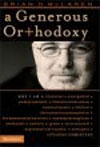Listening to the Beliefs of Emerging Churches, pt. 6
last chapter, finally.
i'll admit some bias right at the start: Karen Ward, the author of the final section of this book, is the abbess/vicar of our church. i originally picked up this book a few months after we'd begun attending church of the apostles (COTA), moving it from where it had sat for months on my amazon wish list into the cart once i realized that she was one of the contributors.
Karen's chapter, "The Emerging Church and Communal Theology," is very different from all the others in three key ways. first, she uses a metaphor of cooking to describe theology and the metaphor runs throughout her chapter to describe the communal aspect of theology. second, a good chunk of her chapter is actually taken from blog posts and comments written by members of the community, thus actually incorporating such communal theology into the very fabric of the text. "This chapter has been written in communitas (in community) as that is how we operate at COTA." third, while the other chapters mention the authors' communities, they are primarily about each individual author's views, whereas Karen's chapter centers on the communal theology to the exclusion of her own, therefore even the responses to the chapter must be read as a response as much aimed at the community as to the actual content of her chapter.
there's a huge shift to move from the beginning of the book, where Mark Driscoll emphasizes scripture through the quoting the bible endlessly to reading Karen's chapter where she describes the difference in how scripture is approached in mainline churches: "In some ways we are being so immersed in Scripture within liturgy that we are like fish in water. It is all around us, and so we often seem unaware of it."
in true emergent church/postmodern fashion, the section on the atonement begins with, "First we are a bit weary of words. Somehow we don't expect that the latest framing of the atonement will help us any more than the last one did; instead, we are looking for nonpropositional ways of coming to understand the atonement, ways that involve art, ritual, community, etc."
"The closest image or analogy I have for how we do everything ("preaching," community, and theology-making) at Apostles is the "potluck," as this is how we function at our Abbey community kitchen meals, at our theology pubs, and in our weekly eucharistic gathering and other forms of community life." she explains how potlucks are not "quick or neat," yet they are nourishing and rich.
she describes the Abbey's kitchen as a constant mess (which after cleaning it once myself, i can attest to), but says that the mess is necessary as "you learn best by cooking, and it seems we learn Christian faith and life best by living it, so let the mess and the glory of community and kitchen living go on."
Karen's chapter (as do the others) covers much more than I quoted here, but the general gist is the idea that community is where faith and theology are discovered, learned, and lived-out.
responses:
- Driscoll: "For the sake of pleasantness, I will begin with what Karen and I hold in common and then explain some of our more significant differences. First, Karen holds to the essential tenets of the Christian faith as articulated in . . . [the] Creeds. Second, Karen planted her church, something that is the logical outgrowth of a truly missional theology." he then goes on to his criticisms: 1. her role as pastor because of her gender; 2. her use of Scripture (because she has three scripture references - which tend to be passages as opposed to the 700 out of context verses he quotes) and use of non-scriptural (read: cultural) texts; 3-6. continue along the same vein (but i'll spare you the length this post will become if i continue).
- Burke: likes her creative chapter "as a reminder that God invites all willing guests, both good and bad, to his party. Not all will reply, not all are suitable to stay, but his church's theology must pragmatically be lived out with this open party invitational approach."
- Kimball: found her creative approach refreshing, and allowing "the other "cooks" in her church to contribute. . . obviously lines up with what she is saying about how her church approaches theology." he continues, "I was refreshed and happy to see that a church doesn't just teach theology in a one-way format, but allows people to be in dialogue and discuss it and "cook" it together."
- Pagitt: "[within the context of her denomination] Karen is effectively seeking to bring change from within, which active theology ought to do. "






